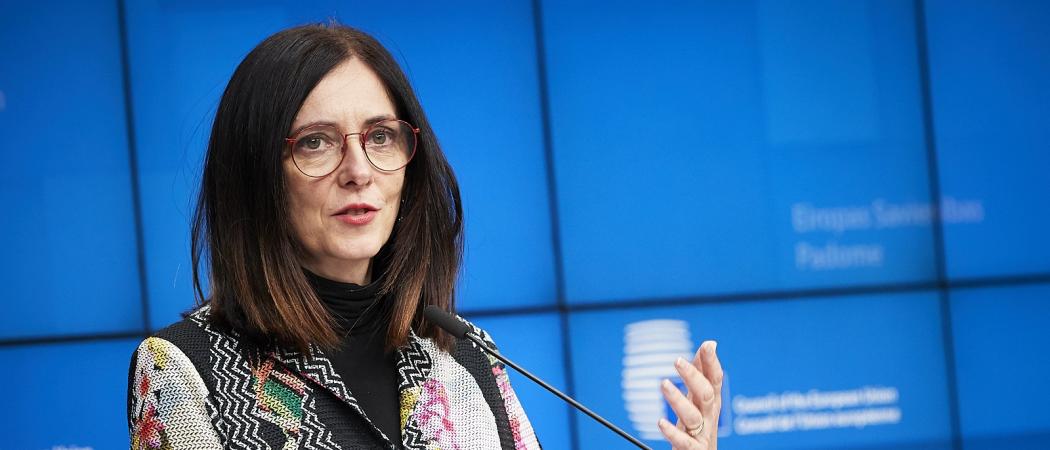All universities in Italy, Greece, Denmark, Poland, Ireland and Hungary are closed down, as EU education and research ministers meet online to discuss coordinated response

Croatian minister for education and science Blaženka Divjak. Photo: European Union
The mass closure of universities in the EU has begun, as government hope lockdown and bans on public gatherings will slow down the spread of COVID-19, the respiratory infection that has now killed more than 4,600 people worldwide.
Croatian minister for education and science Blaženka Divjak has rounded up fellow EU ministers for a web conference to coordinate measures that will keep students safe, while finding ways to continue to provide courses online.
“Viruses do not stop at any borders,” Divjak said, urging ministers to cooperate and share know-how and digital infrastructures for teaching to carry on online in the quarantined areas. “We should put our heads together,” she said.
According to Divjak, “approximately” one third of EU member states have already closed down schools and universities, while another third applied the measure only in some regions. Education systems in the remainder of member states are still working under normal conditions.
Countries most affected by the virus are doing their best to continue teaching “but you cannot expect miracles no matter which [country] is in question,” Divjak said.
Italy was the first EU member state to close its universities last week and move courses online, before the entire country was placed under quarantine.
Denmark, Greece, Ireland, Hungary and Poland have followed suit and suspended courses in all universities.
In Italy, the University of Bologna extended deadlines for tuition fees and distributed free SIM cards to students without access to internet.
Spain suspended courses in the Madrid area, but other universities elsewhere, such as the Esade business school in Barcelona, took the measure ahead of an eventual government top-down decision.
In Romania, after the government closed all schools, several universities moved their courses online as a precaution. All events larger than 100 people in the country are also banned.
Croatia will also suspend courses in the Istrian Peninsula.
Universities across Europe are scrambling to set up technical systems needed to move courses, exams, research and other activities online.
The University of Warsaw has cancelled all lectures and classes unless conducted on-line. The rector banned business travel abroad and participation in domestic conferences until 30 April.
In Belgium, KU Leuven has decided to move lectures online “to the extent possible” and cancelled large-scale events. Staff members were asked to work from home as much as possible.
“Our university is assuming its responsibility, and we are doing everything we can to slow down the further spread of the coronavirus,” rector Luc Sels said in a statement.
Similar precautions have also been taken outside the EU in neighbouring Ukraine and Moldova, where governments have decided to suspend courses in schools and universities and ban large gatherings.
Boosting research
Researchers from the University of Copenhagen are tapping into emergency R&D funding from the European Commission, announcing they have won a €2.7 million grant to work on developing a vaccine against COVID-19.
Copenhagen researchers Morten Agertoug, Adam Sander and Ali Salanti are working with colleagues from the University of Tübingen, Leiden University Medical Center, Wageningen University and the companies AdaptVac and ExpreS2ion.
They hope to complete the first clinical trials within 12 months. “We are already well underway in the process of designing the vaccine, but it is very expensive to scale up a production and make sure that the vaccine is ready for use on humans,” said Agertoug.
The European Commission has announced a research fund of up to €140 million to fight against COVID-19 and has said it will “swiftly” set up a team of EU scientists to help coordinate research efforts currently on the virus, but it has not given any details on the selection procedure and a precise scope of action for the panel.
In the meantime, other public and private funders in Europe are putting more money forward to come up with diagnostics, treatments and vaccines.
The Central European Research Infrastructure Consortium (CERIC) will fast track applications to use research facilities in central Europe for projects focused on COVID-19, without having to go through regular evaluation procedures and be scheduled within one month from submitting the proposal.
Facilities available are a nuclear magnetic resonance infrastructure in Ljubljana, a light scattering laboratory in Graz and the SOLARIS national synchrotron radiation centre in Kraków.
Only samples guaranteed as non-harmful and with no ability to cause or transfer viral infection will be accepted for research.





 A unique international forum for public research organisations and companies to connect their external engagement with strategic interests around their R&D system.
A unique international forum for public research organisations and companies to connect their external engagement with strategic interests around their R&D system.